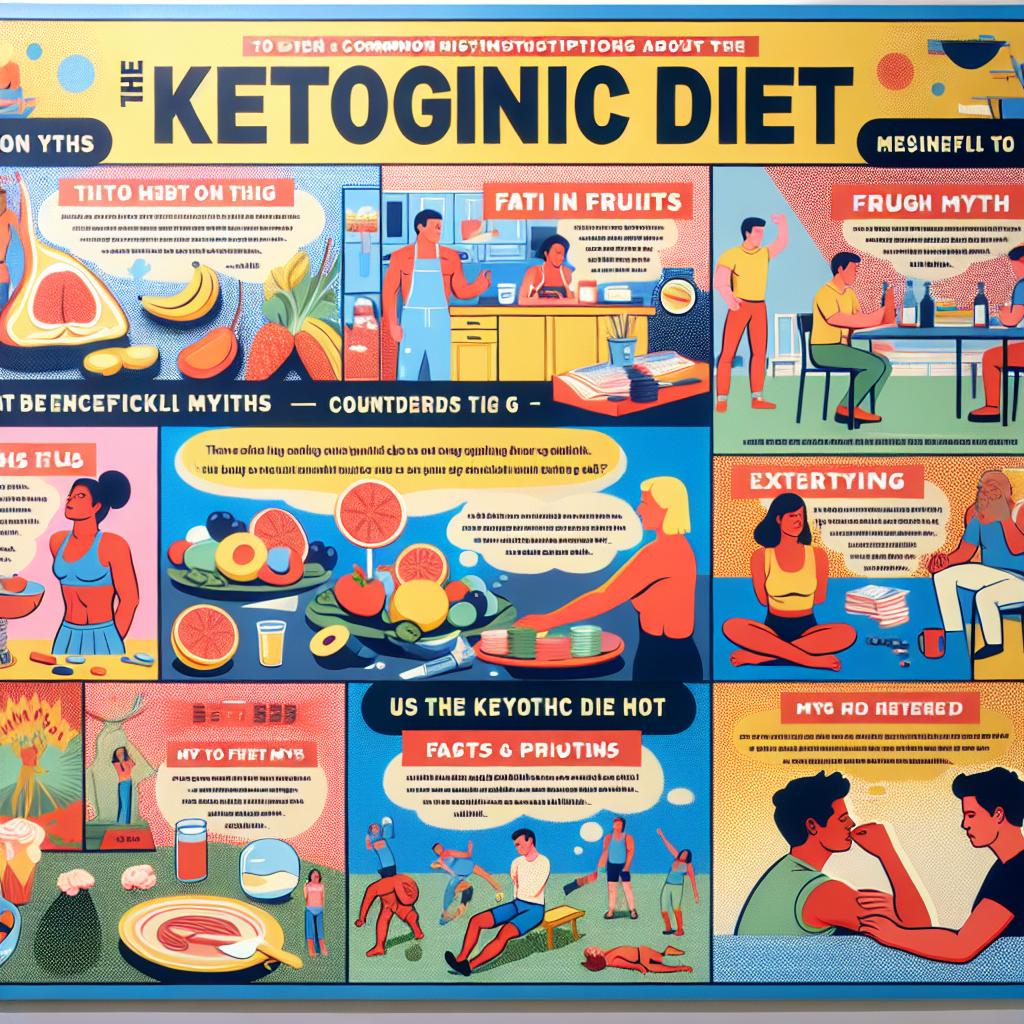This post may contain affiliate links which means I may receive a commission for purchases made through links. Learn more on my Private Policy page.
Introduction: Busting the Myths Surrounding the Keto Diet
In the ever-evolving world of nutrition, the keto diet has emerged as a trendy topic of conversation, sparking both intrigue and debate at dinner tables and online forums alike. But amidst the buzz, a cloud of misinformation looms, casting shadows over this popular dietary approach. Is it really just an excuse to indulge in heaps of bacon? Will it truly turn your body into a fat-burning machine? As we take a closer look, you’ll find that, like many things in life, the truth about the keto diet is more nuanced than the myths suggest. Whether you’re a keto enthusiast, a curious newcomer, or someone who’s hesitated to take the plunge due to conflicting information, come along as we debunk ten of the most common misconceptions about the keto diet. With a friendly, open-minded approach, we’ll sift through the myths and reveal the facts, so you can make informed choices on your health journey. Let’s dive in and separate keto fact from fiction!
Myth-Busting the Basics of Keto for Beginners
There are many misconceptions that can deter beginners from fully embracing the ketogenic lifestyle. One of the most pervasive myths is that a low-carb, high-fat diet is inherently unhealthy. In reality, many healthy fats, such as avocados, olive oil, and nuts, can be incredibly nourishing and provide essential fatty acids and nutrients. Understanding this distinction is crucial, as it highlights the difference between consuming quality fats versus processed or unhealthy ones. It’s also important to note that the keto diet can be tailored to individual needs, proving it doesn’t have to be a one-size-fits-all approach.
Another common myth is the belief that eating carbs will automatically lead to weight gain. While it’s true that the keto diet limits carbohydrates, it’s essential to recognize that not all carbs are created equal. Whole, unprocessed carbs like vegetables and certain fruits can still have a place in a balanced diet, even if you are focusing on low-carb options. This is a perfect opportunity to dispel the fear surrounding carbohydrates and educate beginners about the importance of food quality. The real focus should be on overall lifestyle habits, including proper hydration, sufficient sleep, and regular exercise, which all play a significant role in achieving health goals while enjoying the benefits of the keto diet.

Understanding Carbs: The Good, the Bad, and the Not-So Ugly
When it comes to understanding carbohydrates, it’s crucial to differentiate between the types that nourish our bodies and those that can lead us astray. Complex carbs, such as those found in whole grains, beans, and vegetables, provide a steady source of energy, while simple carbs, like sugars and refined grains, can cause spikes in blood sugar levels. Striking a balance is key; incorporating fiber-rich sources of carbs into your meals can support digestion and overall health. Remember, not all carbs are created equal—it’s the quality, not just the quantity, that matters.
In the context of the keto diet, you might often hear the terms “good,” “bad,” and “not-so-ugly” attached to carbs. Good carbs fuel your body with essential nutrients, whereas bad carbs tend to be processed and offer little nutritional value. The “not-so-ugly” refers to those carbs that can be enjoyed in moderation—even on keto. Think of veggies like broccoli or zucchini which provide fiber and vitamins without sending your carb count through the roof. Here’s a quick comparison:
| Type of Carb | Examples | Nutritional Benefit |
|---|---|---|
| Good Carbs | Quinoa, Lentils, Sweet Potatoes | Rich in vitamins and minerals, promote energy |
| Bad Carbs | White Bread, Sugary Snacks | High in calories, low in nutrition |
| Not-So-Ugly Carbs | Leafy Greens, Berries | Low in carbs, high in fiber and antioxidants |

Healthy Fats Unveiled: Fueling Your Body the Right Way
When it comes to the keto diet, many people are under the impression that all fats are created equal. This misconception can lead to the avoidance of certain healthy fats that are essential for optimal health. In reality, healthy fats play a significant role in fueling your body and can enhance your overall well-being. Incorporating sources like avocados, nuts, seeds, and olive oil can provide the necessary nutrients while also helping you feel satisfied and full, aiding in long-term adherence to the diet.
Additionally, healthy fats support various bodily functions, such as promoting hormone production and aiding in the absorption of fat-soluble vitamins. Understanding the quality of the fats you consume is crucial. For example, compare saturated fats, which should be consumed in moderation, to unsaturated fats that can significantly benefit heart health. Having a strategy for integrating healthy fats into your meals can transform your approach to the keto diet.
| Healthy Fats | Benefits |
|---|---|
| Avocados | Rich in fiber and potassium, supports heart health |
| Nuts | Provides protein and essential fatty acids |
| Seeds | Great source of antioxidants and vitamins |
| Olive Oil | Contains anti-inflammatory properties and promotes healthy skin |

Navigating Nutritional Balance: Beyond the Keto Plate
While the keto diet has garnered significant attention for its low-carb approach and potential weight loss benefits, it’s essential to understand that nutritional balance is not a one-size-fits-all solution. Many enthusiasts often mistakenly believe that ketosis is the only path to sustained health. However, exploring a variety of dietary patterns can lead to a more holistic approach to nutrition. Embracing diverse food groups provides essential vitamins and minerals necessary for optimal body functioning, supporting everything from cognitive health to immune system strength.
Common misconceptions also emerge regarding the types of fats that should dominate a keto meal. It’s easy to think that diving headfirst into any and all fats is the way to go. Yet, focusing on healthy fats is crucial. Incorporating sources such as:
- Avocados
- Olive Oil
- Nuts and Seeds
can enhance your meal’s nutritional profile while maintaining energy levels. In balancing macronutrients, forming a dynamic approach that considers personal health goals, activity levels, and even unique metabolic responses can lead to better long-term outcomes than rigid adherence to high-fat and low-carb principles alone.
Q&A
Q&A: 10 Common Myths About the Keto Diet Debunked
Q1: What’s the number one myth about the keto diet that people believe?
A1: The most common myth is that the keto diet is all about bacon and cheese! While those foods can certainly fit into a keto lifestyle, the diet actually focuses on healthy fats, lean proteins, and plenty of low-carb vegetables. So, yes, you can enjoy bacon, but think of it as a treat rather than the main course!
Q2: Is it true that you can’t eat any carbs on a keto diet?
A2: Not at all! The keto diet doesn’t mean zero carbs. In fact, you can enjoy a limited amount of healthy carbs, primarily from non-starchy vegetables! The key is to keep your carb intake low enough to enter ketosis but not to eliminate carbs entirely. Think of it as a “carb smart” strategy instead of a “carb-less” one!
Q3: Does going keto mean you’ll be hungry all the time?
A3: That’s a popular misconception! Many people find that eating higher amounts of healthy fats keeps them feeling full and satisfied longer. The key is to listen to your body and consume nourishing foods that fill you up. With the right balance, you can be keto and still feel fed and happy!
Q4: Can the keto diet really stunt your athletic performance?
A4: It can feel daunting to think that going keto might hinder your workouts, but many athletes report improved performance, especially in endurance activities. It may take a bit of time for your body to adjust, often referred to as the “keto flu,” but once you’re in ketosis, many find they have enhanced energy levels!
Q5: I’ve heard that the keto diet gives you kidney stones. Is this true?
A5: While there’s a bit of truth to this—dehydration and high protein levels can lead to kidney stones—it’s easily manageable! By staying well-hydrated and balancing electrolytes, you can enjoy the benefits of keto without putting your kidneys at risk. Always consult with a healthcare professional to find the right balance for you.
Q6: Isn’t keto just a fad diet?
A6: While keto has certainly gained popularity and may have elements of a trend, it was originally developed in the 1920s as a therapeutic diet for epilepsy! What’s more, many people continue to benefit from it for weight loss and health management. It’s important to stay informed and approach it with thoughtfulness rather than dismiss it as simply a fad.
Q7: Will I lose muscle if I go keto?
A7: This myth can be alarming, especially for fitness enthusiasts. The truth is that when done correctly, the keto diet can help preserve muscle mass while promoting fat loss. Including enough protein and engaging in regular strength training can keep those muscles intact and thriving!
Q8: Do you have to count every single carb on a keto diet?
A8: While tracking your macros can help you understand what works for you, it doesn’t have to feel like a math class! Many find success by focusing on whole, low-carb foods and developing an intuitive eating approach. Flexibility is key—do what makes you feel good.
Q9: Is keto bad for your heart because of all the fat?
A9: It’s all about the type of fats you consume! Healthy fats from avocados, nuts, seeds, and olive oil can be beneficial for heart health. Just be mindful of the quality of fats in your diet. Not all fats are created equal, and the right choices can lead to a healthier heart!
Q10: If I go off keto, will I gain all the weight back?
A10: While transitioning off keto can lead to quick weight regain for some, it largely depends on lifestyle choices afterward. Many people find ways to incorporate elements of keto into their lives long-term without falling into old habits. The key is to adopt sustainable eating practices that suit you, allowing for flexibility and happiness without the pressure of perfection!
Conclusion
Remember, every diet is personal, and what works for one may not work for another. It’s essential to educate yourself and feel confident in your choices. Now, go forth and debunk those myths with ease!
Final Thoughts
As we wrap up our journey through the fascinating (and often misunderstood) world of the keto diet, it’s clear that separating fact from fiction is essential for anyone considering this lifestyle. We’ve debunked these 10 common myths, shining a light on the truth and empowering you to make informed choices. Remember, knowledge is your best ally, whether you’re diving into a low-carb feast or simply exploring new dietary options.
So, as you step forward on your health quest, hold your head high—armed with accurate information and a sprinkle of curiosity. Don’t hesitate to share these insights with friends and family who may need a little keto clarity in their lives! And if you have your own keto myths to share or questions about this delectable journey, let’s keep the conversation going. Cheers to a happy, healthy you, full of delicious, nourishing food choices!

